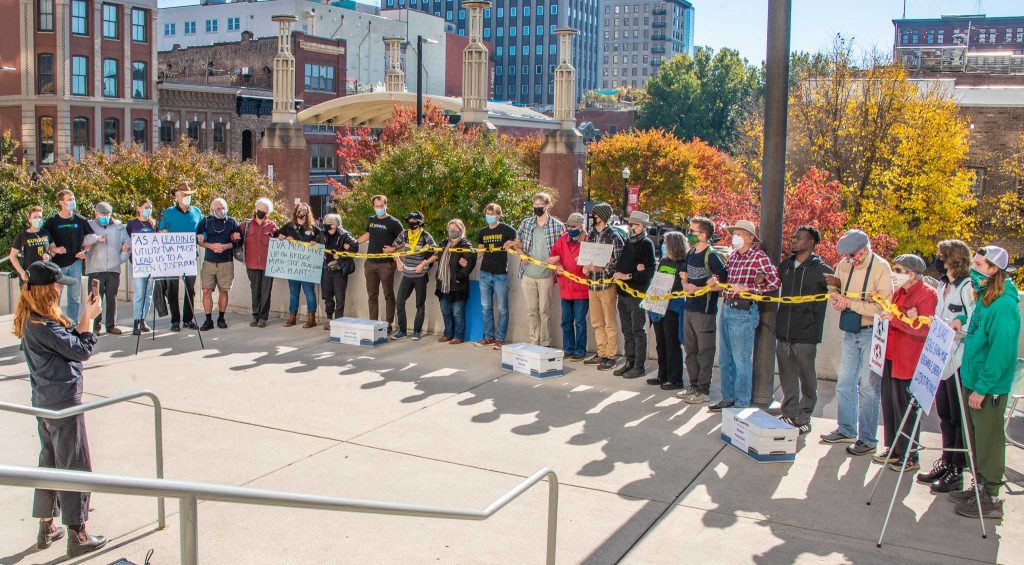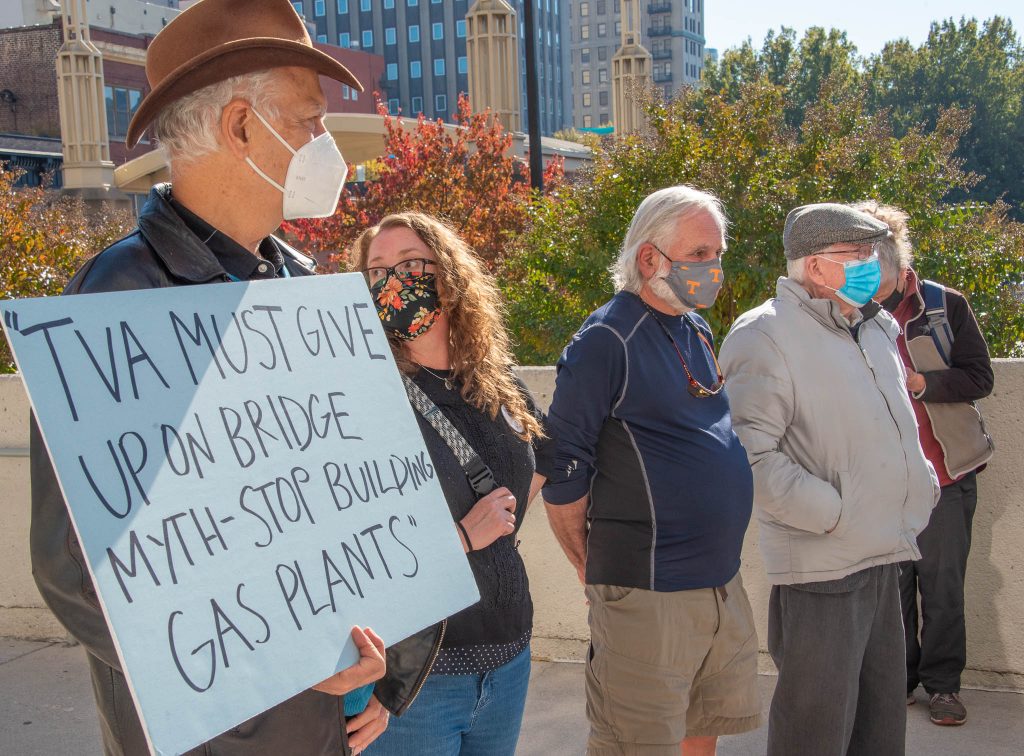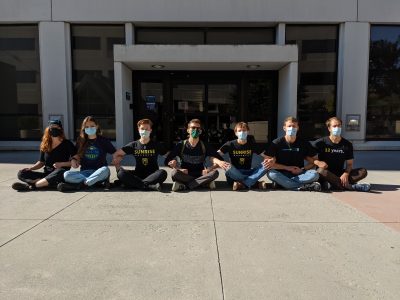Front Porch Blog

Protestors at a Nov. 10, 2021, rally locked arms outside of a TVA board meeting. Photo by John Todd Waterman
The federally owned Tennessee Valley Authority took a different approach to navigating public concern during the pandemic.
Communities across the region were calling for TVA to implement a utility disconnection moratorium at the local power companies that distribute TVA’s electricity, which, like TVA, are not regulated by the Tennessee Public Utilities Commission. But TVA, the nation’s largest public utility, used the opportunity of a global pandemic to cancel public listening sessions entirely and to withhold written public input from the media and public. The utility explained the move by claiming that it lacked the technological capabilities to host a virtual public input meeting.
This lack of transparency and lack of public influence in TVA’s decision-making follows a disturbing trend in the erosion of TVA’s public power model.
TVA’s “public power” governance model
Beginning in 1933, TVA’s New Deal legacy involves the electrification of the region, critical flood and erosion control, and the creation of tens of thousands of union jobs in a right-to-work region. But that legacy is also colored by a laundry list of top-down decisions that have displaced whole communities, polluted air and watersheds, and harmed and disempowered workers and residents. Instead of strengthening its public-input processes in response to these mistakes, TVA’s governance changes further place impacted residents at arm’s length.
TVA initially received federal funding for its energy, environmental stewardship and economic development programs. For 70 years, TVA was governed by a full-time, three-member board and, unlike private utilities, TVA had no CEO and no shareholders. Local power companies purchased electricity from TVA and sold that power to people and businesses in the area. TVA used this not-for-profit model to offer relatively low rates to the region.
Over time, federal appropriations to TVA were eliminated and the public corporation became fully self-financing through electricity sales and by selling power system bonds. By the early 2000s, TVA had moved to a nine-person, part-time board of directors with a full-time CEO, who is the highest-paid federal employee in the country. TVA’s current CEO, Jeff Lyash, has an annual salary of more than $10 million.
TVA is not regulated by state-level public utilities commissions, which typically oversee investor-owned utilities like Duke Energy. The regulating role falls largely to TVA’s board of directors, which is composed of members from the region who are nominated by the U.S. president and then confirmed by the U.S. Senate.
As TVA’s board structure changed, committee meetings allowed select board members and TVA staff to discuss upcoming decisions and generate recommendations for upcoming votes behind closed doors. These board committee meetings have never been open to the public, though in recent years members of Congress have proposed federal legislation that would make these meetings more transparent.
The public’s ability to influence and hold TVA accountable has become increasingly limited.
Today, ratepayers are able to provide limited input on TVA’s planning through formal environmental review processes, during which members of the public can comment on environmental impact statements or environmental assessments after project plans and alternatives have already been drafted.
When final reviews are released, comments from ratepayers and public interest organizations are then shared back to the public, typically filed under explanations for how concerns or ideas have already been addressed in TVA’s review process. TVA also receives some input from “public advisory councils,” whose members are public and private stakeholders who have been nominated by governors throughout TVA’s region.
Many residents have found these public-input processes to have seemingly little influence over the giant utility’s decision-making. Recently, the Energy and Commerce Committee of the U.S. House of Representatives sent an inquiry letter to TVA expressing concern over high electric bills, underinvestment in energy efficiency and renewable power, and inadequate decarbonization goals.
Local ratepayers and organizations had been calling attention to these same issues for years in TVA’s public councils and public comment processes, to seemingly no effect.
Local residents push back against lack of transparency and public input
When the TVA board stopped hosting public listening sessions in 2020, dozens of organizations and community groups in the Tennessee Energy Democracy Movement (TVEDM) mobilized to demand remote, transparent and accessible public board listening options from TVA.

Protestors hold up signs opposing TVA’s gas expansion plans. Photo by John Todd Waterman
The local groups also held multiple rallies outside of TVA headquarters in Knoxville, protesting their continued exclusion from decision-making during TVA’s August and November board meetings.
The events included powerful stories from workers who cleaned up the Kingston Coal Ash spill and their families, local faith leaders, youth climate activists and volunteer leaders. Amazingly, these organizers also collected more than 4,000 public comments to TVA and posted them publicly on the TVEDM webpage. TVA later used these figures to praise its closed-door input policy as successful for leading to more public input via comments.
But while public listening sessions were closed, the board’s public-input reports also downplayed the prevalence of comments received that focused on clean energy, public listening and coal ash worker safety. Meanwhile, TVA staff began drafting plans for the second-largest natural gas buildout of any utility in the country.

Protestors sit outside the entrance of TVA headquarters in Knoxville. Photo by Brianna Knisley
What’s next?
New board members have the potential to turn around some of TVA’s bad practices and decisions, but repeated delays in the Senate confirmation process have resulted in an underrepresented TVA board of only five Trump-appointed members, which is choosing to delegate the board’s authority on historic and highly impactful decisions.
For instance, at their November meeting, the board voted to delegate decision-making authority on the future of two of its coal-fired power plants (which TVA may convert to natural gas) to CEO Jeff Lyash.
After two years of the public demanding transparency and accessible input, TVA finally reinstated public listening sessions on Feb. 9 in Bowling Green, Kentucky, but offered no virtual-input options. That listening session was followed by a board meeting that delegated even more decision making authority away from the board and to the CEO.
Bonnie Swinford, an organizer with the Tennessee Chapter of the Sierra Club, contributed to this post.
PREVIOUS
NEXT
Related News

Leave a comment
Your email address will not be published. Required fields are marked *

Leave a Comment